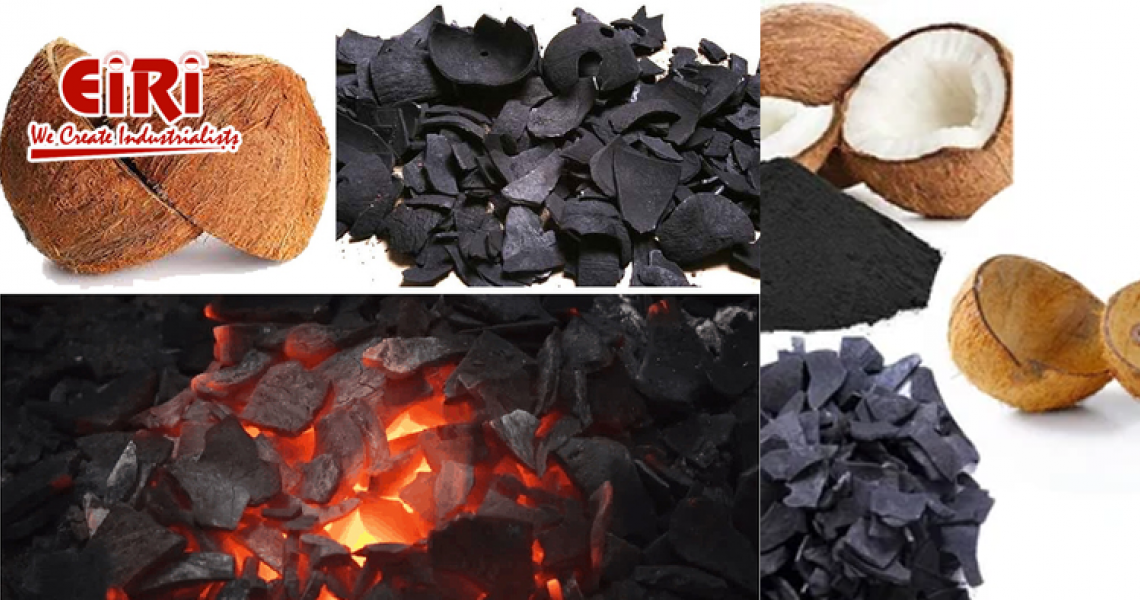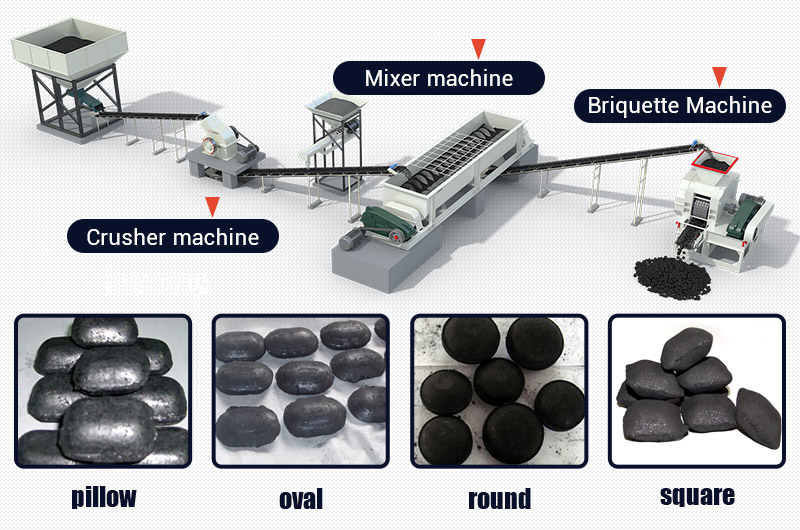Unveiling the Potential: Coconut Charcoals Making Business

In recent years, the coconut charcoals industry has witnessed a surge in interest, driven by the increasing demand for sustainable and eco-friendly alternatives to traditional charcoal. This comprehensive article delves into the overview of the industry, explores current market dynamics, and forecasts the future growth of this thriving business.
The driving force behind this heightened interest is the growing demand for products that are not only effective but also environmentally sustainable and eco-friendly. Specifically, consumers are seeking alternatives to traditional charcoal that have a lower environmental impact.
Traditional charcoal production often involves cutting down trees, contributing to deforestation, and generating significant carbon emissions. In contrast, coconut charcoals are positioned as a more sustainable option. They are typically produced using coconut shells, a byproduct of the coconut industry, which would otherwise be considered waste. Transforming these shells into charcoal provides a way to repurpose agricultural byproducts, reducing the overall environmental footprint.
The surge in interest suggests a shift in consumer preferences towards products that align with environmentally conscious values. This trend is not only seen as a positive step in mitigating environmental challenges but also as an opportunity for businesses in the coconut charcoals industry to meet this demand and thrive in a market increasingly focused on sustainability.
Overview of the Coconut Charcoals Industry:
The Rise of Sustainable Alternatives:
The coconut charcoals industry has emerged as a key player in the sustainable energy sector. Coconut shells, a byproduct of the coconut industry, are transformed into high-quality charcoal, offering a cleaner and more environmentally friendly alternative to traditional wood-based charcoals. This shift aligns with the global trend towards sustainable practices and eco-conscious consumer choices.
Coconut shells, typically considered a byproduct in the coconut industry, are repurposed and undergo a transformation process to become high-quality charcoal.
Unlike traditional wood-based charcoals, which often contribute to deforestation and environmental degradation, coconut charcoals present a more sustainable option. The utilization of coconut shells, which would otherwise be discarded as waste, minimizes the industry's reliance on additional resources and reduces the environmental impact associated with traditional charcoal production.
The process of transforming coconut shells into charcoal aligns seamlessly with the global trend favoring sustainable practices and reflects the preferences of consumers who are increasingly inclined towards eco-conscious choices. This shift in consumer behavior is part of a larger movement where individuals are actively seeking products and industries that prioritize environmental responsibility, ultimately contributing to a more sustainable and ecologically mindful global landscape. The coconut charcoals industry's alignment with this trend positions it as a key player in the ongoing efforts to transition towards cleaner and greener energy alternatives.
Production Process of Coconut Charcoals:
The production of coconut charcoals involves carbonizing coconut shells through a carefully controlled process, resulting in a high-carbon and low-ash charcoal. This method not only utilizes agricultural waste but also reduces the environmental impact associated with traditional charcoal production.

The production process of coconut charcoal involves several steps to transform coconut shells, a byproduct of the coconut industry, into high-quality charcoal. Here is a detailed overview of the production process:
1. Collection and Sorting:
The first step involves the collection of coconut shells. These shells are acquired as byproducts from coconut processing units. Once collected, the shells undergo a sorting process to remove impurities, debris, or any contaminants.
2. Cleaning and Drying:
The sorted coconut shells are then cleaned to remove any remaining husk or dirt. After cleaning, the shells are dried thoroughly. Drying is a crucial step as it reduces the moisture content in the shells, making them suitable for the carbonization process.
3. Carbonization:
Carbonization is the core process where coconut shells are heated in the absence of air to convert them into charcoal. There are different methods of carbonization, but one common approach is using a kiln. The coconut shells are placed in the kiln, and the temperature is gradually increased in a controlled environment. This process breaks down the organic compounds in the shells, leaving behind carbonized coconut shells, which are essentially the charcoal.
4. Activation (Optional):
In some cases, the charcoal may undergo an activation process. Activation involves exposing the charcoal to high temperatures and certain gases to create pores in the material. This increases the charcoal's surface area, enhancing its ability to adsorb substances. Activated coconut charcoal is often used in applications like water purification and air filtration.
5. Cooling:
After carbonization, the charcoal is allowed to cool. This is typically done slowly to prevent the charcoal from cracking or forming irregular shapes. The cooling process is crucial to ensure the structural integrity of the charcoal.
6. Sizing and Grading:
The cooled charcoal is then sized and graded according to specific requirements. Different applications may necessitate different sizes and grades of charcoal. For example, charcoal used in barbecues may require larger chunks, while charcoal used in air and water filters may need to be finely powdered.
7. Packaging:
The final step involves packaging the coconut charcoal for distribution. The packaged charcoal is ready for use in various applications, such as grilling, industrial processes, or as a component in activated charcoal products.

Applications and Market Niches:
Coconut charcoals find applications in various industries. From grilling and barbecuing to industrial uses like water purification and metallurgy, the versatility of coconut charcoals contributes to its growing market presence. The rise of the health and wellness trend has also led to increased use in activated charcoal products for filtering and detoxification.
The applications of coconut charcoal are diverse, extending beyond traditional uses. The versatility of coconut charcoal has led to its incorporation into various market niches, catering to both consumer and industrial needs. Here is a detailed exploration of the applications and market niches for coconut charcoal:
1. Grilling and Barbecuing:
One of the primary and most common applications of coconut charcoal is in grilling and barbecuing. Coconut charcoal briquettes are favored for their long-lasting heat, low ash production, and the absence of additives, providing a clean and flavorful grilling experience. The growing trend of eco-conscious consumers has increased the demand for sustainable alternatives in this niche.
2. Industrial and Metallurgical Uses:
Coconut charcoal finds applications in industries, particularly in metallurgy. It is utilized as a carbon source in metal smelting processes. The high carbon content and low impurities make coconut charcoal an ideal choice for these applications.
3. Activated Charcoal Products:
Activated charcoal derived from coconuts is used in various products for air and water purification. Its high porosity and adsorption capacity make it effective in trapping impurities and contaminants. Activated coconut charcoal is found in water filters, air purifiers, and even personal care products like face masks and toothpaste.
4. Cooking and Culinary Uses:
Beyond grilling, coconut charcoal is employed in cooking applications where a mild smoky flavor is desired. It is used in traditional cooking methods, such as clay pot cooking or as an ingredient in certain recipes that benefit from the unique aroma and taste imparted by coconut charcoal.
5. Health and Wellness Products:
The health and wellness industry has embraced coconut charcoal for its potential detoxification properties. Some dietary supplements and detox products feature activated coconut charcoal, claiming benefits such as digestive health and toxin removal.
6. Art and Craft:
In the craft and art niche, coconut charcoal serves as a medium for creating charcoal drawings. Artists appreciate its smooth texture and the unique tonal qualities it imparts to their artwork.
7. Horticulture and Agriculture:
Coconut charcoal biochar, a type of charcoal produced through controlled pyrolysis, is used in horticulture and agriculture. It is added to soils to improve fertility, water retention, and nutrient absorption, contributing to sustainable and organic farming practices.
8. Fuel for Hookahs:
In certain regions, coconut charcoal cubes are popularly used as a clean-burning and long-lasting fuel source for hookahs. This application capitalizes on the natural and mild flavor profile of coconut charcoal.
9. Renewable Energy Source:
In some regions, coconut shells, a byproduct of coconut charcoal production, are further utilized as a renewable energy source. They can be converted into bioenergy through processes like gasification, providing an additional sustainable aspect to coconut charcoal production.
10. Specialty Products:
Innovative entrepreneurs are exploring niche markets by introducing specialty coconut charcoal products. These may include designer charcoal for upscale grilling experiences or unique formulations for specific industrial applications.
The versatility of coconut charcoal has enabled its integration into various market niches, showcasing its adaptability and eco-friendly appeal. The sustained interest in sustainable practices and natural alternatives continues to drive the exploration of new applications for coconut charcoal in diverse industries.
Market Forecast and Current Dynamics:
Growing Global Demand:
The global demand for coconut charcoals is on the upswing, with consumers seeking cleaner and more sustainable alternatives. The growth is particularly pronounced in regions where coconut production is abundant, creating opportunities for entrepreneurs to tap into local and international markets.
Eco-Conscious Consumerism:
The shift towards eco-conscious consumerism is a significant driving force. As more consumers prioritize sustainability in their purchasing decisions, coconut charcoals have gained traction as an eco-friendly option. This trend is expected to continue, influencing market dynamics positively.
Emerging Market Trends:
In addition to traditional uses, the coconut charcoals industry is witnessing innovative applications. The development of coconut charcoal-based products, such as air and water purifiers, has opened new avenues for business growth. Collaborations with other industries, like the beauty and wellness sector, showcase the adaptability and potential for diversification within this market.
Future Growth Prospects:
Technological Advancements:
Future growth in the coconut charcoals industry is likely to be influenced by technological advancements. Innovations in production processes, such as more efficient carbonization methods or improved packaging technologies, can enhance the quality and marketability of coconut charcoals.
Sustainable Practices and Certifications:
Businesses in this industry that prioritize sustainable practices, ethical sourcing, and obtain relevant certifications may gain a competitive edge. As consumers increasingly value transparency and ethical production, these factors are likely to become key drivers for future growth.
Global Expansion and Export Opportunities:
With the increasing global interest in sustainable products, coconut charcoals making businesses have the potential to expand their reach internationally. Exploring export opportunities and catering to the growing demand for eco-friendly alternatives in various regions could be a strategic avenue for future growth.
In conclusion, the coconut charcoals making business is poised for significant growth, driven by the demand for sustainable and eco-friendly products. Entrepreneurs entering this industry have the opportunity to contribute to environmental conservation while building a profitable and versatile business. As the industry continues to evolve, staying attuned to market trends, embracing technological advancements, and maintaining a commitment to sustainability will be crucial for long-term success.










